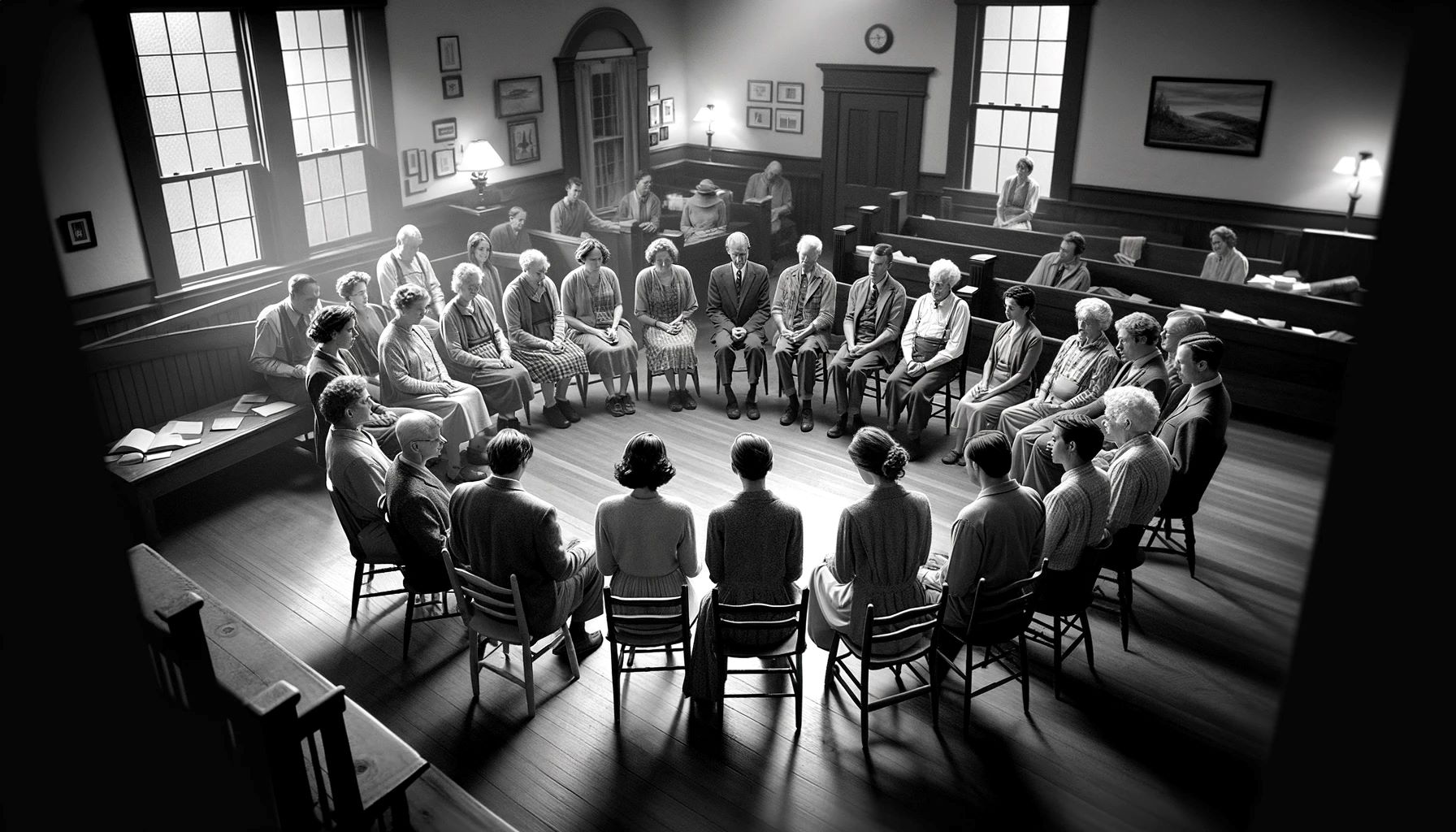Home>Theology and Spirituality>When Will The Charismatic Gifts Cease


Theology and Spirituality
When Will The Charismatic Gifts Cease
Published: February 11, 2024
Ericka Andersen, an editor at Christian.net, expertly merges digital strategy with content creation, focusing on faith and societal issues. Her communication skills enhance the platform's engaging narratives, fostering meaningful dialogue on belief's impact on society.
Discover the theological perspective on when the charismatic gifts will cease in this insightful exploration of spirituality and theology. Explore the significance and implications of this topic.
(Many of the links in this article redirect to a specific reviewed product. Your purchase of these products through affiliate links helps to generate commission for Christian.net, at no extra cost. Learn more)
Table of Contents
Introduction
The topic of the cessation of charismatic gifts has been a subject of significant debate and contemplation within theological circles. The charismatic gifts, also known as spiritual gifts, are believed to be bestowed upon individuals by the Holy Spirit for the edification of the church and the advancement of God's kingdom. These gifts, as outlined in the New Testament, include prophecy, speaking in tongues, healing, and discernment, among others.
The discussion surrounding the cessation of these gifts revolves around the question of whether they are still actively present in the church today or if they ceased at a certain point in history. This inquiry has sparked diverse viewpoints, with proponents and opponents presenting compelling arguments rooted in theology, historical analysis, and biblical interpretation.
As we delve into this complex and nuanced topic, it is essential to approach it with an open mind and a spirit of discernment. By exploring the historical, theological, and scriptural dimensions of the charismatic gifts, we can gain a deeper understanding of the perspectives that shape this discourse. Moreover, by examining the arguments for and against the cessation of these gifts, we can appreciate the rich tapestry of beliefs and convictions that characterize the Christian faith.
In the subsequent sections, we will embark on a comprehensive exploration of the cessation of charismatic gifts, seeking to shed light on the intricacies of this theological debate. By navigating through the historical perspectives, scriptural foundations, and contrasting viewpoints, we aim to unravel the complexities surrounding the timing and relevance of these spiritual gifts in the contemporary context. Let us embark on this enlightening journey, guided by a spirit of inquiry and a quest for deeper spiritual understanding.
Read more: What Are Charismatic Gifts
Understanding the Charismatic Gifts
The charismatic gifts, also referred to as spiritual gifts, are manifestations of the Holy Spirit's presence and power within the Christian community. These gifts are described in the New Testament, particularly in passages such as 1 Corinthians 12 and Romans 12, where the apostle Paul provides insights into their nature and purpose. The charismatic gifts encompass a diverse range of abilities and manifestations, each serving a unique function within the body of believers.
One of the key aspects of the charismatic gifts is their diversity. These gifts are not uniform or standardized; rather, they reflect the multifaceted nature of the Holy Spirit's work within the church. They include gifts of wisdom, knowledge, faith, healing, miracles, prophecy, discernment of spirits, speaking in tongues, and interpretation of tongues, among others. Each of these gifts is intended to contribute to the spiritual growth and vitality of the community, fostering unity and mutual support among believers.
Furthermore, the charismatic gifts are characterized by their edifying nature. They are designed to build up, encourage, and strengthen the church, enabling believers to fulfill their calling and serve one another with love and humility. Whether through acts of healing, words of wisdom, or the exercise of faith, these gifts are instrumental in nurturing a vibrant and spiritually empowered community.
It is important to recognize that the charismatic gifts are not distributed arbitrarily but are apportioned by the Holy Spirit according to His sovereign will. They are not earned or acquired through human effort but are graciously bestowed as a manifestation of God's grace and love for His people. As such, the exercise of these gifts is grounded in humility and a deep sense of dependence on the Spirit's guidance and empowerment.
In essence, the charismatic gifts represent a profound expression of God's presence and activity within the church. They serve as a testament to the ongoing work of the Holy Spirit, equipping believers for service, ministry, and the proclamation of the gospel. By understanding the diverse, edifying, and sovereign nature of these gifts, we gain insight into their significance within the Christian faith and the broader theological discourse surrounding their continuation or cessation.
Historical Perspectives on the Charismatic Gifts
The historical perspectives on the charismatic gifts offer a fascinating lens through which to examine the evolution of beliefs and practices within the Christian tradition. Throughout the centuries, the manifestation and interpretation of charismatic gifts have been intertwined with the ebb and flow of theological movements, ecclesiastical developments, and cultural contexts.
During the early centuries of the church, the charismatic gifts were prevalent and integral to the expression of faith. Accounts from the New Testament and early Christian writings attest to the presence of spiritual gifts such as prophecy, healing, and speaking in tongues. The vibrant display of these gifts underscored the dynamic and fervent nature of early Christian communities, shaping their worship, communal life, and witness to the broader society.
As the church entered the medieval and post-medieval periods, the understanding and emphasis on charismatic gifts underwent significant shifts. The rise of institutionalized forms of Christianity, coupled with the influence of scholastic theology, led to varying perspectives on the continuation of these gifts. While some traditions maintained a robust belief in the ongoing manifestation of charismatic gifts, others adopted more cautious or restrictive stances, often in response to theological controversies and ecclesiastical authority.
The Protestant Reformation of the 16th century brought forth diverse attitudes toward the charismatic gifts among the reformers and their followers. Figures such as Martin Luther and John Calvin expressed openness to certain charismatic phenomena, albeit with discernment and theological scrutiny. Concurrently, the emergence of radical reform movements, including the Anabaptists and the early Pentecostals, witnessed a fervent reclamation of charismatic experiences and practices, challenging prevailing theological paradigms and ecclesiastical structures.
In the modern and contemporary eras, the charismatic movement, which gained momentum in the 20th century, revitalized interest in the spiritual gifts within various Christian traditions. This movement, characterized by a renewed emphasis on the Holy Spirit's empowerment and the experiential dimension of faith, contributed to a resurgence of charismatic practices and beliefs across denominational boundaries.
The historical perspectives on the charismatic gifts reflect the dynamic interplay between theological convictions, cultural dynamics, and ecclesiastical developments. They offer valuable insights into the enduring significance of these gifts within the tapestry of Christian history, inviting contemplation on their continuity and relevance in the present age.
Scriptural Basis for the Charismatic Gifts
The scriptural foundation for the charismatic gifts is rooted in the teachings and narratives found in the New Testament. These sacred texts provide profound insights into the nature, purpose, and manifestation of spiritual gifts, offering a compelling basis for understanding their enduring relevance within the Christian faith.
The apostle Paul, in his first letter to the Corinthians, devotes an entire chapter (1 Corinthians 12) to elucidate the diversity and function of the charismatic gifts within the body of Christ. He emphasizes the unity of believers despite their diverse spiritual gifts, underscoring the essential role of each gift in contributing to the holistic well-being of the church. Paul's exhortation reflects a deep theological understanding of the charismatic gifts as integral components of the Christian community's spiritual vitality and mission.
Furthermore, Paul's letter to the Romans (Romans 12) provides additional insights into the charismatic gifts, emphasizing their practical outworking in the context of Christian service and ministry. The apostle underscores the importance of exercising these gifts with sincerity, diligence, and love, highlighting their transformative impact on the lives of both individuals and the broader faith community.
The book of Acts, which chronicles the early church's inception and expansion, offers vivid accounts of charismatic manifestations such as speaking in tongues, prophetic utterances, and miraculous healings. These narratives serve as compelling testimonies to the dynamic presence of the Holy Spirit and the tangible expression of spiritual gifts within the formative period of the Christian movement.
Moreover, the Gospel accounts, particularly in the ministry of Jesus, depict instances of miraculous healings, exorcisms, and supernatural demonstrations of power, foreshadowing the outpouring of the Holy Spirit and the subsequent emergence of charismatic phenomena within the early church.
Collectively, these scriptural references form a robust foundation for the charismatic gifts, affirming their intrinsic connection to the life, ministry, and teachings of Jesus and the apostolic community. They underscore the continuity of these gifts as essential components of the Christian faith, transcending historical epochs and cultural contexts. By grounding the charismatic gifts in the authoritative witness of the New Testament, believers are invited to embrace and steward these gifts with reverence, discernment, and a deep sense of spiritual responsibility.
Arguments for the Cessation of Charismatic Gifts
-
The Completion of Scripture: One of the primary arguments for the cessation of charismatic gifts is rooted in the belief that the canon of Scripture, comprising the Old and New Testaments, represents the complete and final revelation of God's will and purpose for humanity. Advocates of this view contend that with the culmination of the biblical canon, there is no longer a need for extraordinary manifestations of the Spirit, as the written Word provides comprehensive guidance and instruction for the church.
-
Historical Precedence: Proponents of cessationism often cite the early church fathers and historical theologians who observed a gradual decline in the frequency and prominence of charismatic gifts following the apostolic era. They argue that the extraordinary manifestations of the Spirit, such as speaking in tongues and prophetic utterances, were particularly prevalent during the foundational period of the church but waned as the church became more established.
-
Maturation of the Church: Another rationale for the cessation of charismatic gifts is based on the concept of the church's maturation and institutional development. Advocates of this perspective posit that as the early Christian community solidified its doctrinal foundations and organizational structure, the need for extraordinary signs and wonders diminished, giving way to a more ordered and mature expression of faith.
-
Theological Coherence: Cessationists often emphasize the theological coherence of a cessationist framework, asserting that the ongoing manifestation of charismatic gifts introduces theological and practical tensions within the church. They argue that the potential for misuse, misinterpretation, and divisiveness associated with charismatic phenomena necessitates a cessationist stance to maintain doctrinal clarity and spiritual stability.
-
Missionary Context: Some proponents of cessationism point to the missionary context as a factor in the cessation of charismatic gifts. They contend that the primary function of charismatic gifts, particularly speaking in tongues and miraculous healings, was to authenticate the message of the gospel in unreached regions during the early expansion of the church. As the gospel became firmly established in diverse cultural settings, the need for these extraordinary attestations diminished.
These arguments for the cessation of charismatic gifts reflect a nuanced theological perspective that seeks to reconcile historical, doctrinal, and practical considerations within the framework of Christian belief. While these arguments have garnered support within certain theological traditions, they continue to be subject to rigorous debate and critical examination within the broader spectrum of Christian thought.
Arguments against the Cessation of Charismatic Gifts
-
Continuation of God's Sovereignty: Opponents of cessationism assert that the sovereign nature of God's work and the ongoing activity of the Holy Spirit defy rigid temporal constraints. They argue that the cessationist position imposes artificial limitations on the Spirit's ability to bestow charismatic gifts, thereby undermining the dynamic and transcendent nature of God's interaction with His people.
-
Scriptural Precedence: Advocates for the continuation of charismatic gifts point to scriptural passages, such as 1 Corinthians 13:8-12, which suggest that these gifts will persist until the eschatological consummation. They contend that the absence of explicit biblical directives indicating the cessation of charismatic gifts necessitates a posture of openness to their ongoing manifestation within the church.
-
Historical Testimonies: Opponents of cessationism cite historical accounts of charismatic experiences and miraculous occurrences throughout the Christian era, challenging the notion of a definitive cessation of these gifts. They highlight the enduring presence of charismatic phenomena in various global contexts, underscoring the continuity of these manifestations beyond the early church period.
-
Ecclesiastical Renewal and Revival: Proponents of the continuation of charismatic gifts emphasize the role of these gifts in fostering spiritual renewal, empowerment, and revival within the church. They point to instances of contemporary charismatic movements and revivals as evidence of the Spirit's ongoing work, revitalizing believers and communities through manifestations of prophecy, healing, and other charismatic expressions.
-
Missional Significance: Those advocating for the continuation of charismatic gifts emphasize their missional significance in engaging diverse cultural and religious contexts. They argue that these gifts, including the gift of tongues and supernatural healings, play a vital role in authenticating the gospel message and demonstrating God's power in contexts where traditional forms of communication may be limited or ineffective.
-
Theological Vitality: Opponents of cessationism underscore the theological vitality and experiential dimension that charismatic gifts bring to the life of the church. They contend that these gifts, when exercised in accordance with biblical principles and spiritual discernment, contribute to the vibrancy, diversity, and spiritual dynamism of the faith community, enriching worship, ministry, and communal life.
The arguments against the cessation of charismatic gifts reflect a robust theological and experiential framework that challenges the notion of a definitive cessation of these manifestations. By drawing upon scriptural, historical, and practical considerations, proponents of the continuation of charismatic gifts advocate for a posture of openness to the ongoing work of the Spirit, inviting believers to embrace the diverse and transformative expressions of God's empowering presence within the church and the broader Christian witness.
Conclusion: When Will the Charismatic Gifts Cease?
The question of when the charismatic gifts will cease continues to elicit diverse perspectives and impassioned discourse within theological circles. This inquiry transcends mere intellectual curiosity, delving into the heart of Christian belief, practice, and the ongoing manifestation of the Holy Spirit's power within the faith community. As we navigate the complexities of this theological conundrum, it becomes evident that the cessation of charismatic gifts defies simplistic temporal constraints or dogmatic pronouncements.
The dynamic interplay of historical, scriptural, and theological considerations underscores the intricate tapestry of beliefs and convictions that shape the discourse on the continuation or cessation of these gifts. While proponents of cessationism present compelling arguments rooted in the completion of Scripture, historical precedence, and doctrinal coherence, opponents of cessationism counter with assertions of God's sovereignty, scriptural precedence, and the enduring testimonies of charismatic experiences throughout Christian history.
Amidst these contrasting viewpoints, it becomes apparent that the cessation of charismatic gifts transcends mere doctrinal debate; it embodies a profound tension between the temporal and the transcendent, the structured and the spontaneous, and the historical and the eschatological. The very nature of the charismatic gifts, as expressions of the Holy Spirit's presence and power, eludes definitive temporal boundaries, inviting believers to embrace a posture of discernment, humility, and openness to the Spirit's ongoing work.
In navigating the question of when the charismatic gifts will cease, it is imperative to approach this discourse with a spirit of unity, mutual respect, and a shared commitment to the foundational tenets of the Christian faith. Regardless of one's theological persuasion, the enduring significance of the charismatic gifts in fostering spiritual vitality, communal edification, and the proclamation of the gospel remains a unifying focal point for believers across diverse traditions.
As we grapple with the complexities of this theological inquiry, we are reminded of the apostle Paul's exhortation in 1 Corinthians 12:7, where he emphasizes that the manifestation of the Spirit is given for the common good. This timeless truth underscores the intrinsic value of the charismatic gifts in nurturing a vibrant, spiritually empowered community, transcending temporal speculations and theological conjectures.
Ultimately, the question of when the charismatic gifts will cease invites believers to embrace a posture of humility, discernment, and spiritual receptivity, acknowledging the mysterious and transcendent nature of the Spirit's work within the church. It beckons us to cultivate a deeper reliance on the Spirit's guidance, a fervent pursuit of unity amidst diversity, and a steadfast commitment to the transformative power of God's empowering presence within the body of Christ.














